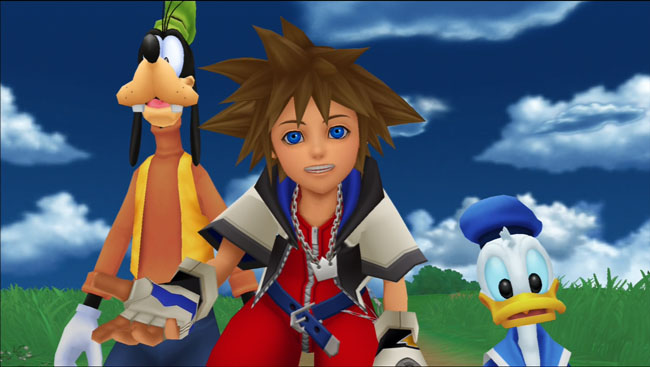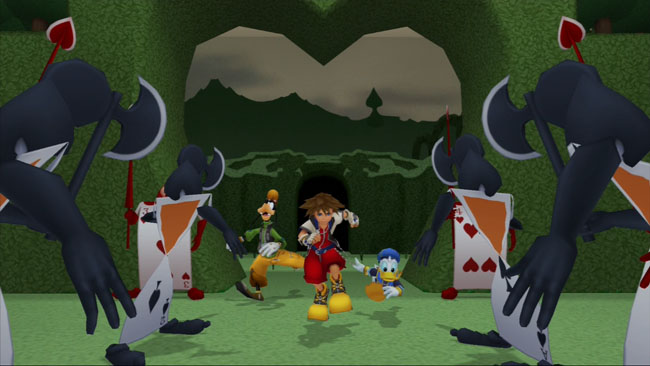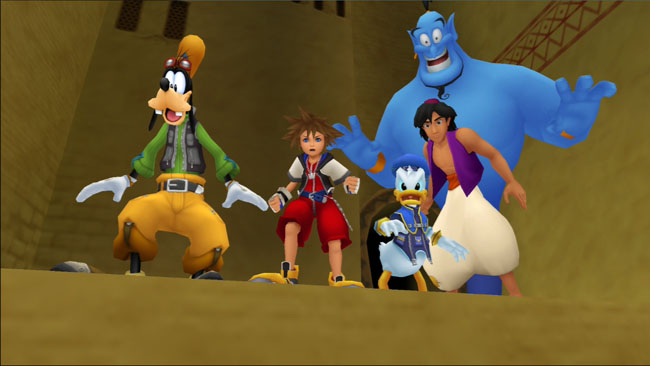TL;DR
Step into a nostalgic blend of Final Fantasy strategy and Disney magic with Kingdom Hearts HD 1.5 Remix! This PlayStation 3 remaster revisits Sora's epic quest alongside Donald and Goofy to save the Disney universe from the Heartless. While the vibrant graphics and strong voice acting impress, the game's arcade-style combat and occasional clunky platforming can be a hurdle. Early story pacing might test your patience, but a deeply engaging adventure awaits those who push through. If you're curious about this unique cross-over or revisiting a beloved classic, dive into this HD reimagining. Read the full review to see if this magical journey is for you!
https://www.youtube.com/watch?v=3diijyK34qI
Like many others, my introduction to Square’s fantastic world was with the release of Final Fantasy VII. This Japanese role-playing game possessed a remarkable ability to captivate players, constructing a compelling 40-hour universe. The battles were both engaging and strategic, providing an experience players would eagerly immerse themselves in.
Kingdom Hearts debuted in the early 2000s on the Playstation 2. In this title, Square (now Square Enix) and Disney collaborated to forge a world that integrated Square’s Final Fantasy concept with Disney’s established tradition of classic films, characters, and references. In essence, Cloud meets Donald Duck. This collaboration also replaced the classic, turn-based combat system with an arcade-style system, emphasizing joystick skill over strategic planning.
Now, in 2013, Kingdom Hearts is presented in a direct remaster, now in HD for Playstation 3 under the title Kingdom Hearts HD 1.5 Remix. This compilation includes the sequel Re: Chain of Memories and the 3DS game 358/2 Days (which, in this iteration, is presented as a single, extended film rather than an interactive game). Having not played these titles upon their original release 11 years prior, these impressions are based on a first-time playthrough.
The game’s narrative centers around Sora, a young man characterized by vivid dreams and philosophical inquiries, along with a distinctive hairstyle and a thirst for adventure. He experiences a dream of falling, awakening in an unfamiliar world. This world is both partially recognizable and populated by malevolent forces and Disney characters, specifically Goofy and Donald Duck, who become his allies and companions in arms against evil. Together, the trio embarks on a quest to locate King Mickey, Sora’s friends from his home island, and defeat an army of enemies known as The Heartless. At its peak, Kingdom Hearts offers a poetic and profoundly philosophical experience. However, in its less successful moments, the integration of Disney characters delivering dialogue within a Final Fantasy setting feels somewhat disjointed.
The graphics are remarkably detailed and vibrant. From Sora’s initial awakening on the island to the diverse locales visited (ranging from Wonderland to Hercules’ arena and The Little Mermaid’s underwater realm), the combination of colors and evocative atmospheres is consistently impressive. An early boss encounter (The Darkness) demonstrates Square’s willingness to explore darker and more serious themes, rendered with equal fidelity to the lighter aspects. Overall, the presentation is commendable.
The sound design is somewhat inconsistent. There are Disney-themed musical excerpts that initially provide enjoyment but can become repetitive (those familiar with It’s a small world after all will understand…). The voice acting is exceptionally well-executed, with Haley Joel Osment leading as Sora, accompanied by a cast of notable Hollywood actors in supporting roles (although not all voice actors reprise their roles from the original Disney films). The familiar sound effects from Final Fantasy are present, offering a sense of nostalgic familiarity.
The most significant departure from Final Fantasy is the decision to position Kingdom Hearts as a third-person perspective arcade adventure. The camera offers free 360-degree rotation, allowing players to control their character’s jumps, punches, and interactions with the environment (e.g., lifting barrels, pushing stones). Effective 3D platforming is a skill mastered by Nintendo in Mario Galaxy and Sony in Ratchet & Clank. Kingdom Hearts does not execute this element with the same level of polish. The controls lack precision and are difficult to fully master. Several segments, such as the chase after Raiku early in the game, become unnecessarily challenging due to the unstable nature of Sora’s movement in pressured situations. The boss encounters also suffer occasionally; the game incorporates a lock-on mechanic intended to facilitate target tracking, but the chaotic movement of Sora, the boss, and the camera can transform it into a guessing game, leading to uncoordinated attacks. While the controls are generally adequate, the game’s playability is undeniable, but this missed opportunity does detract from the overall enjoyment.
The other notable issue concerns the story and its pacing. The initial 2-3 hours of Kingdom Hearts are not particularly engaging. It begins stylishly and poetically, incorporating a brief tutorial and manageable battles. However, the gameplay soon transitions into a repetitive series of “run-and-fetch XYZ” quests, repeated numerous times consecutively. Combined with relatively lengthy and slow-paced cutscenes (which are now skippable in this remaster), the momentum slows significantly, potentially causing players to lose focus and interest. While a considerably more dynamic and rewarding adventure awaits those who persevere, the control issues and lethargic beginning may cause some players to abandon what is ultimately a worthwhile game, provided they dedicate the necessary time and effort.
Briefly, regarding the other two titles included in this package: the sequel, Re: Chain of Memories, introduces a combat system based on a card-based strategy mechanic, interwoven with arcade elements. This system aligns more closely with my personal preferences, and it is enjoyable to continue the adventure after the initial game, which requires approximately 15-20 hours to complete, depending on the player’s level of thoroughness. The inclusion of 358/2 Days is a curious choice – while the story is compelling, it is presented as a non-interactive movie. Perhaps a standalone Blu-ray release would have been more appropriate.
I appreciate both Disney and Final Fantasy (particularly installments 7 and 9). Kingdom Hearts is visually impressive and represents something of a dream fulfillment for Disney enthusiasts, offering encounters with numerous (100!) classic characters from Disney’s extensive film library of approximately 50 titles. However, the game is over a decade old, which is noticeable in certain aspects. The controls are not fully optimized, and the game occasionally struggles to immerse players in engaging narratives and objectives immediately. The decision to merge FF-style role-playing with arcade gameplay also presents a challenge in identifying the ideal target demographic – platforming enthusiasts may find it too deliberate, while FF fans might perceive it as too demanding/complex in requiring agile control inputs. Despite these shortcomings, the game delivers a compelling and, after a period of acclimation, immersive adventure set within a truly magical universe. I believe this experience justifies the journey itself, despite its flaws.




